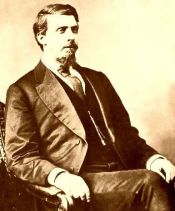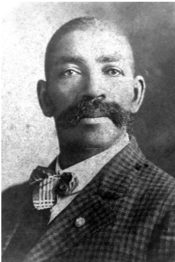 In the 1968 film titled Hang ‘Em High, Clint Eastwood plays the part of fictional Jed Cooper. Cooper was an innocent man who survives a lynching in the Oklahoma Territory. The year is 1889 and Jed is driving a small herd of cattle across a river when a posse of nine men surround him and demand that he prove that he’s come by the cattle legally. Jed shows them his receipt and transfer of ownership. Only the man who sold him the cattle had stolen them from someone else and then killed him and as far as this posse is concerned, Jed Cooper is a murdering cattle rustler. They hang him—only he doesn’t die. It’s an entertaining film, for sure. In any case, Jed Cooper goes on to become a Deputy US Marshal in Oklahoma and, as it turns out, he’s one bad-ass cop. It was just entertaining fiction, of course. But there really was a bad-ass Deputy US Marshal [1] in the Oklahoma Territory who made Clint Eastwood’s character seem like a pussy cat —and he wasn’t white.
In the 1968 film titled Hang ‘Em High, Clint Eastwood plays the part of fictional Jed Cooper. Cooper was an innocent man who survives a lynching in the Oklahoma Territory. The year is 1889 and Jed is driving a small herd of cattle across a river when a posse of nine men surround him and demand that he prove that he’s come by the cattle legally. Jed shows them his receipt and transfer of ownership. Only the man who sold him the cattle had stolen them from someone else and then killed him and as far as this posse is concerned, Jed Cooper is a murdering cattle rustler. They hang him—only he doesn’t die. It’s an entertaining film, for sure. In any case, Jed Cooper goes on to become a Deputy US Marshal in Oklahoma and, as it turns out, he’s one bad-ass cop. It was just entertaining fiction, of course. But there really was a bad-ass Deputy US Marshal [1] in the Oklahoma Territory who made Clint Eastwood’s character seem like a pussy cat —and he wasn’t white.
Bass Reeves was born into slavery in 1838 in Crawford County, Arkansas. His owner was a man by the name of William Steele Reeves. When Bass was around 8-years old, William Reeves moved to Grayson County, Texas near present day Sherman, Texas (part of the old Peter’s Colony). Bass may have served Colonel George Reeves, William’s son. George served in the Texas legislature, and at the time of his death from rabies in 1882, served as the Speaker of the Texas House. In any event, during the Civil War, it appears as if George and Bass had an unhappy encounter resulting in Bass kicking George’s ass.
Bass fled north into the Indian Territory (Oklahoma) and lived among the Indians until the Emancipation Proclamation of 1863. Now a free man, Bass Reeves moved to Arkansas where he acquired a plot of land and farmed/ranched near the town of Van Buren. It was there that he married Nellie Jennie from Texas, with whom he had ten children: five boys and five girls.

Judge Isaac C. Parker
Meanwhile, in 1875, President Ulysses S. Grant appointed Isaac C. Parker as a federal judge in the Western District of Arkansas, which included the Indian territory (present-day Oklahoma). Parker in turn appointed James F. Fagan to serve as United States Marshal and ordered him to hire 200 deputies. Fagan had heard about Bass Reeves over in Van Buren. Bass was reputed to be a man who knew the Indian territory and could speak several tribal languages. Fagan recruited Bass as one of his deputies and that’s how Bass Reeves became the first black federal deputy west of the Mississippi River. Judge Parker was tasked with cleaning up rampant lawlessness in the Indian territories. His order to Fagan: Bring these outlaws in, dead or alive.
Initially, Bass Reeves was assigned as a Deputy U.S. Marshal for the Western District of Arkansas, which also had responsibility for the Indian Territory. He served in that capacity until 1893 when he transferred to the Eastern District of Texas near Paris.
As a Deputy US Marshal, Reeves worked alongside other legendary lawmen: Heck Thomas, Bud Ledbetter, Chris Madsen, and Bill Tilghman. Their responsibility was to cover 75,000 miles; at the time, Judge Parker’s court at Fort Smith, Arkansas, was the largest jurisdiction in the United States. A Deputy Marshal would set off in search of one or more outlaws with a wagon, a cook, and an assistant —more often than not, an Indian. Reeves was illiterate so, he would ask someone to read him the warrants and he would memorize them. Whenever was asked to produce his warrant, Reeves never failed to select the correct one.

Deputy US Marshal Bass Reeves
Bass Reeves was an imposing, clean-cut figure. He stood over 6’ tall, dressed in a suit, wore a white shirt and a tie, sported a wide brimmed hat, and he kept his boots polished and clean. Reeves carried two Colt pistols, butt-forward to facilitate a fast draw. To top off his appearance, he always rode a white stallion. The disarming part of this lawman was that he was always soft-spoken, polite, and courteous.
On one occasion, Reeves rode out to serve a warrant on a notorious trio of brothers whose habit included shooting lawmen, robbing stagecoaches, and intimidating their neighbors. Not long after arriving in town, Reeves calmly approached the Brunter Brothers, handed one of them the arrest warrant, and then in a soft-spoken voice suggested that it would be to everyone’s advantage to come along quietly. Unhappily for the Brunter family, all three went for their guns. Reeves was quicker; two of the boys were shot at point blank range. He disarmed the third boy and beat him unconscious with the boy’s own weapon. Reeves delivered the remaining brother to the Parker courthouse.
Reeves was clever and courageous in his pursuit of outlaws. He once pursued two such men in the Red River Valley near the Texas border. Gathering a posse, Reeves established a camp site some 28 miles from where the two desperados were thought to be hiding. After reconnoitering the local area, Reeves disguised himself as a tramp (hiding his weapons and badge under his clothing) and set off on foot. When he arrived at the hideout, the home of one of the outlaw’s mother, Reeves was wearing old, worn out shoes, dirty clothes, and carrying a walking cane. His old floppy hat sported three bullet holes.
Arriving at the home, Reeves asked the woman who lived there if he could rest his aching feet. He was being pursued by a posse, he said, mean men who put three bullet holes in his hat. He asked her for a bite to eat and some water to drink. Sitting at the table eating his meal, the woman began to tell him of her two outlaw sons. She suggested that the three men could form a gang. Reeves said he’d like to think on it, but needed a rest. She allowed that he could stay and rest a bit longer. Toward sunset, a whistle sounded from outside. The woman went out of the house and responded with another whistle. Before long, two riders came into the yard and after a few long moments, she brought the two riders inside the house. She introduced her two sons to Reeves. After discussing their various crimes, Reeves and the two outlaws agreed to team up.
Later, bunking in the same room, Reeves kept a close eye on the outlaws. As soon as they were asleep, he handcuffed them and, as early morning approached, kicked the boys awake and marched them out the door. Their mother followed along for three miles cursing Reeves every step of the way. He walked the two hombres 28 miles back to his camp and within days, Reeves turned them over to the Parker court. His reward was $5,000.00.
Despite his preference for dressing in nice clothes, Reeves often dressed in disguises, appearing as a cowboy, a farmer, tramp, shootist or outlaw. He usually departed Fort Smith with a pocket full of warrants, always returning with a wagon load of miscreants, people who stood accused of a wide range of crimes. After receiving his pay in fees and rewards, Reeves spent time with his family before making another run on Oklahoma outlaws.
Reeves worked for thirty-two years as a Federal peace officer in the Indian Territory and became one of Judge Parker’s most valued deputies. Reeves brought in some of the most dangerous criminals of the time and although having a few close calls, was never wounded. In his time, Reeves made 3,000 arrests —fourteen of whom he killed when they made the tragic mistake of resisting arrest.
 Among his contemporaries, Bass was one of the toughest. He was also an honest man and remained true to the law. He once arrested his own son on a charge of murder. They boy was convicted, served time in jail, and when released went on to live a law-abiding life.
Among his contemporaries, Bass was one of the toughest. He was also an honest man and remained true to the law. He once arrested his own son on a charge of murder. They boy was convicted, served time in jail, and when released went on to live a law-abiding life.
In 1897, Reeves was placed under the Muskogee Federal Court. When Oklahoma became a state in 1907, then 68-year-old Bass Reeves became an officer in the Muskogee, Oklahoma police department. He served for two years as a policeman before succumbing to serious illness. Bass Reeves passed away in 1910. We remember him today as one of the great Old West lawmen.
Sources:
- Burton, A. T. Black Gun, Silver Star: The Life and Legend of Frontier Marshal Bass Reeves. Lincoln: University of Nebraska Press, 2008.
Endnotes:
[1] The office of United States Marshal and Deputy Marshal were created by Judiciary Act of 1789. Marshals were given extensive authority to support federal courts within their judicial districts to carry out the lawful orders of judges, the Congress, or the President of the United States. As part of our systems of checks and balances, owing to their broad authority, US Marshals and Deputies were limited to four-year (renewable) terms, always serving at the pleasure of the President of the United States.

$5,000 in 1890 is equivalent in purchasing power to about $134,681.32 today. Nice work.
LikeLiked by 1 person
If you can find it … 😀
LikeLike
I believe you wrote of Bass before, but this had more depth than the last account I read.
I await the movie.
Denzel?
Smile, be polite and have a plan to kill…
LikeLiked by 2 people
I didn’t think I did him enough justice the first time. We’ll just call it a re-write. Thanks for commenting.
LikeLiked by 1 person
I guess that it took tough men– strong men — like Bass Reeves to “tame” the West.
LikeLiked by 2 people
Noting that even back then, most Americans were happy to leave their personal security in the hands of better men. Bass was one of those men. Thank you for stopping by my friend.
LikeLike
Pingback: The Oklahoma Badlands | Old West Tales